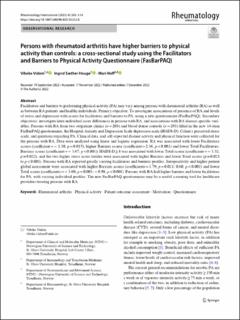Persons with rheumatoid arthritis have higher barriers to physical activity than controls: a cross-sectional study using the Facilitators and Barriers to Physical Activity Questionnaire (FasBarPAQ)
Peer reviewed, Journal article
Published version
Permanent lenke
https://hdl.handle.net/11250/3063920Utgivelsesdato
2023Metadata
Vis full innførselSamlinger
Sammendrag
Facilitators and barriers to performing physical activity (PA) may vary among persons with rheumatoid arthritis (RA) as well as between RA patients and healthy individuals. Primary objective: To investigate associations of presence of RA and levels of stress and depression with scores for facilitators and barriers to PA, using a new questionnaire (FasBarPAQ). Secondary objectives: investigate inter-individual score differences in persons with RA, and associations with RA disease-specific variables. Persons with RA from two outpatient clinics (n = 203) and blood donor controls (n = 293) filled in the new 14-item FasBarPAQ questionnaire, the Hospital Anxiety and Depression Scale depression scale (HADS-D), Cohen’s perceived stress scale, and questions regarding PA. Clinical data, and self-reported disease activity and physical function were collected for the persons with RA. Data were analyzed using linear and logistic regression. RA was associated with lower Facilitators scores (coefficient = − 1.30, p = 0.015), higher Barriers scores (coefficient = 2.36, p < 0.001) and lower Total Facilitators-Barriers scores (coefficient = − 3.67, p < 0.001). HADS-D ≥ 8 was associated with lower Total scores (coefficient = − 3.32, p = 0.022), and the two higher stress score tertiles were associated with higher Barriers and lower Total scores (p = 0.023 to p < 0.001). Persons with RA reported greatly varying facilitators and barriers profiles. Seropositivity and higher patient global assessment were associated with higher Barriers scores (coefficients = 1.79, p = 0.011; 0.60, p < 0.001) and lower Total scores (coefficients = − 3.60, p = 0.003; − 0.98, p < 0.001). Persons with RA had higher barriers and lower facilitators for PA, with varying individual profiles. The new FasBarPAQ questionnaire may be a useful screening tool for healthcare providers treating persons with RA.

